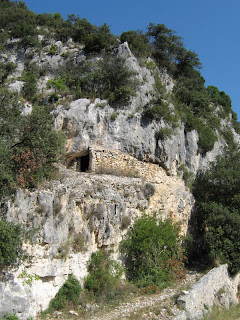"Look out. Corridor-blockers."
That was how the Communist always described parties of old people who stayed in hotels. Eventually, of course, he became one himself. It comes to us all, if we live long enough.
My mother, age 87, has gone to
Llandudno for five days, on a coach trip, all by herself.
She went on a similar one a few months ago, and loved it, and this one is to
the same hotel. It has everything she likes: it's on the sea front, it has friendly staff, a heated swimming-pool, and it has entertainment and dancing every night.
Perfect, I thought, when I saw it in the National Holidays brochure - - and so it proved.
Last time she went just for three days so when I saw there was a five-day trip, I booked it for her. She was delighted.
This, of course, did not stop me feeling really REALLY nervous as I took her to the coach station this morning.
Everyone else had one of those cases on wheels that you can trundle along, but not my mother. She could have borrowed ours, but chose not to. Instead, she had a big black bag that she could hardly lift, and a rucksack. It's pink and green - - or it was once. That rucksack is Spirit of the Seventies. It wasn't new when David Bowie was singing about life on Mars.
"Mum, I'd love to buy you a new rucksack. How about it?"
"Ohhh no. This one's an old friend. I like it. It fits me."
Mum understands everything, but remembers - - well - - not very much. Not very much that's new, anyway. She liked this hotel. "They don't mind how many times you ask what your room number is."
When she says things like that, it breaks my heart, because I remember the stunningly intelligent woman she used to be. There was only one scholarship to University for her part of the North-West when she was eighteen: and she got it, which is how she came to be in Leeds.
But now she can't remember things. So the bag and the rucksack had to be opened and checked numerous times and, as we left the house, she picked up The Umbrella with the Broken Spoke.
"Mum, that one's broken. I'm sure you have others."
"Ahhh, wll, I like that one. Anyway, it'll be better than nothing." The bag was unzipped again, and in it went.
I drove to town, we parked and walked to the coach station. Mum insisted on taking the rucksack and I took the black bag.
We had to sit and wait for the coach to arrive. I wondered what would happen if Mum gets lost in Llandudno. She did have her address book with her, with all the addresses written in the Communist's neat writing, from years ago.
"Daphne's Little Phone. Expensive" was how he described my very first mobile, which was not, of course, little at all by today's standards.
Last night I read all his entries in the address book, and cried a bit, to myself, so Mum wouldn't see.
Whilst we were waiting for the coach, I wrote some things on a piece of paper. Mum's name: her date of birth: no allergies: no particular medical problems: my name: that I was her daughter: my contact details - - - all just in case. I put it in her handbag.
The coach arrived and a big swarm of elderly people - - yes, elderly but probably the oldest was ten years younger than my mother - all headed towards the coach.
I left Mum standing at the front of the coach and made my way to the back, for her name to be ticked off on a list and her luggage put in the boot.
"Is this you, then?" asked the driver, looking me up and down and noticing my extreme youth, and I was very pleased that he looked surprised.
"No, no, it's my mother. Eighty-seven. Very small."
"I'll look out for her," he said cheerily.
Now a queue of people had formed behind me and the way back to the front of the coach was really narrow, in between this coach and the next, and it took what seemed like half an hour as they all tried to move out of my way with their bags and walking sticks.
Slow, perhaps, but smiling. Looking forward to their holiday.
"Oooh, sorry love. Come on through."
So I climbed onto the coach with Mum and found her seat, and settled her down, and she hugged me and thanked me a lot, and I told her to be careful and not to even THINK of swimming in the sea - - and then I turned round to go out again and the corridor of the coach was completely blocked by people with sticks and hand luggage and newspapers and sandwiches.
"Excuse me - - I'm not going to Llandudno, I'm just seeing my mother onto the coach."
They all had a little jolly comment as I squeezed past them.
"Eeeeh, lass, you should come with us. We'll have a grand time."
"Yes, well, I can't, I'm working this week."
"Oh, poor you. Hey, Mary, she can't come because she's working this week."
"Oh, poor lass. Working eh? I bet you wish you could come with us."
Corridor-blockers, all right, but lovely with it. I stopped being so worried about my Mum. I turned round and she was already deep in conversation.
Several hours later, she rang me.
"Well it was a long journey - lots of stops - but we got here all right. I know I should have rung earlier but I've been in the pool all afternoon."
By now I'd guess she'll have drunk a glass or two of wine and will be either dancing or chatting up one of the more attractive waiters. I hope she'll have a lovely week.





















